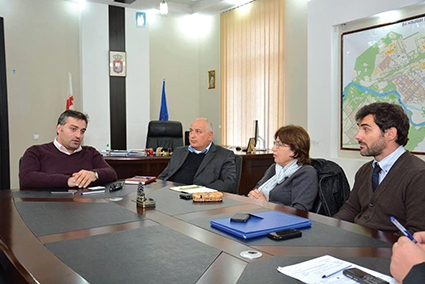Rustavi to Have 3 Kindergartens with High Energy Efficiency Standards
Sustainable Development and Policy Center (SDAP) was founded in 2009 with the aim of assisting the Government of Georgia and local companies in assessment and evaluation of the processes and phenomena associated with the concept of sustainable economic development. Based on conducted research and analysis, it provides support in implementation and realization of various energy efficient projects.
Through carrying out energy efficiency and environmental expertise, comprehensive energy audits, developing energy passports for new buildings and evaluating their design, the company provides a full spectrum of services connected to energy resources, analytical assessment, analysing economic benefits and exploring possibilities for the implementation of renewable energy resources.
From the day of its foundation, SDAP has successfully implemented numerous international projects administered by USAID, EBRD, EU and DANIDA.
In 2014, the SDAP Center was awarded a European Union (EU) grant for the energy-efficient reconstruction of three kindergartens in the city of Rustavi. The project aims to achieve high energy efficiency and greenhouse emission reduction; a goal and a concept that is relatively new for Georgia. The project is funded by the EU Commission within the Sustainable Urban Demonstration Program (SUDEP) under the Covenant of Mayor initiative which was joined by the city of Rustavi in 2011. Rustavi Municipality is a partner of the project.
GEORGIA TODAY met Dr. Karine Melikidze, Director of the Sustainable Development and Policy (SDAP) Center, to talk about their activities and, most importantly, about the ongoing retro-fitting of those three kindergartens.
“The aim behind founding our center back in 2009 was to assist the Georgian government in implementing the concept of sustainable development. Our major focus is on energy efficiency and renewable energy utilization. The construction sector is one of the key users of energy, and as we still don’t have applied standards in Georgia for energy usage, the risk of wasting it still remainsa critical issue,”she says, emphasizing the stand point of the organization. One of the first international projects realized by SDAP, as sub-contractors, was NATELI, supported by USAID, which saw numerous energo-audits and energy-passports for local hospitals, which, according to Melikidze, is a crucial step to enable the construction process to be led following the new approaches and requirements.
The situation, Melikidze says, is radically different now compared to previous years, “to a large extent thanks to the many incentives advocating the energy-eficiency and renewable energy usage,” and yet another project: Enhancing Capacity for Low Emission Development Strategies (EC LEDS), Clean Energy Program, where SDAP has been involved as a partner organization, working on developing energy performance methodology for buildings.
“Lots of work has also been done to ensure a shared, common vision on energy efficiency standards in Europe. Being involved in these projects gave us a chance to discuss energy efficiency Directives, namely EPBD (the 2010 Energy Performance of Buildings Directive), as we had the chance to analyze how the situation was changing in this regard in Europe. Of course, each country has its own goals complying with its economic development, however, there must be a convergence of these visions,” the SDAP Director says. “We’ve been actively carrying out and setting energy efficiency regulations and standards to be implemented in Georgia, and as a result they will take effect in one year’s time,” she told us.
The EU-funded project retro-fitting three kindergartens in Rustavi was implemented under the Covenant of Mayor initiativeintroduced by the European Union in 2008, uniting local and regional authorities in taking on responsibility for raising energy efficiency and using renewable energy resources within their respective territories, focusing on lowering CO2 emissions by 30% by 2030, thus contributing to the development of a green, environmentally friendly-oriented economy and improving the living conditions of the population.
“Rustavi city had a Sustainable Energy Action Plan (SEAP) and we assisted the local government to start implementing it. That’s why we chose three kindergartens, N40, N41 and N6, for energy efficient reconstruction. These kindergartens were built during soviet times with no energy efficient standards being met. The rehabilitation works started in 2015. First, we made a feasibility study, carried out the energy audits and then launched the actual reconstruction process. There were no central heating systems in the kindergartens, so we installed a boiler-room, a heating system combined with the DHW system with solar-collectors, and we changed the windows to double-glazed PVC. Since this is a so-called demonstration project, we tried to maximize the energy efficiency of it as much as we could, also insulating the walls, roofs and floors,” Melikidzesaid.
“We also installed mechanical ventillation with a recuperator that saves energy and installed a new comprehensive electrical system with a ground loop and energy-effective bulbs. All outdoor constructions have also been insulated. We conducted an energy-audit after a feasibility study, which, from 2017-2018 will become a necessary component in Georgian legislation where energy-efficiency projects are concerned. NEEAP, the first National Energy Efficiency Action Plan, is already drafted with all the major sub-sectors such as industry, building, public sector and transport sectors included”.
At this stage, the energy effective reconstruction of two Kindergartens (N6 and N40) is complete and Kindergarten N41will be fully rehabilitated in August 2017.
“Signing the EU Association agreement brings with it the responsibility to follow requirements set by the EU regarding energy efficiency directives, and it is crucial to comply with them in various sectors,” Melikidze said. “In the construction sector, energy efficient rehabilitation must be carried out, and for that, the energy saving potential must be assessed. As an organization, together with international experts, we’re here to assist our governmentin implementing the energy efficient strategy. Georgia has to become a reliable partner, we have huge potential to be integrated into the European energy market and we have to bring our systems to the point where we can sell the energy produced in our country,” she concluded.
Nino Gugunishvili












